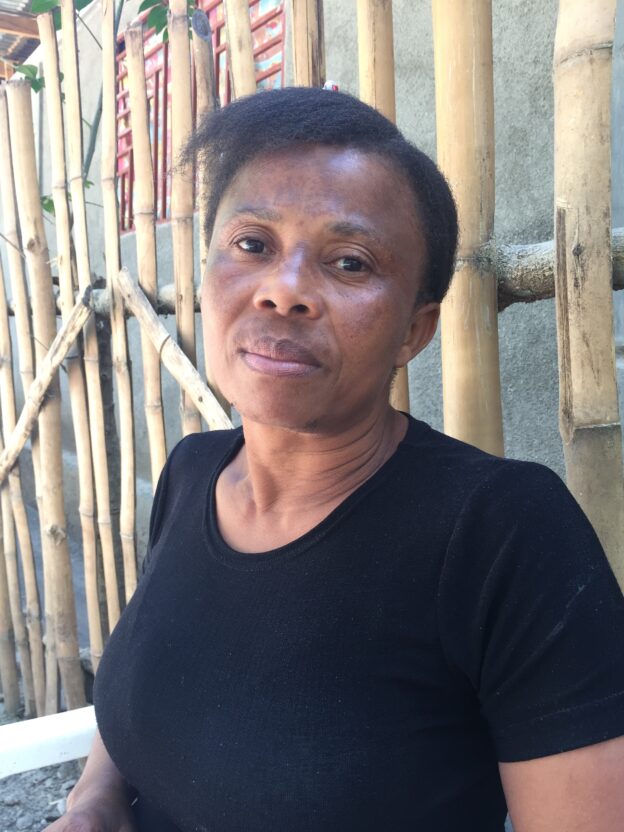Ezione François lives in Bwa Kabrit, a small rural neighborhood just outside of downtown Laskawobas. When she joined the CLM program in 2016, things were really hard. “I didn’t even have a chicken. I had to depend on what my husband’s family occasionally sent to pay for the children’ school.”
It hadn’t always been that way for her. Early in her marriage, she and her husband were doing well. He’s a professional baker. He worked for a bakery owner six days a week. On Sundays, the owner allowed him to use the bakery to make his own bread, which Ezione would come sell. Roving bread merchants would take a supply fresh out of the oven early Sunday morning on credit, and they’d come back to pay for the bread in the afternoon. Ezione and her family were making progress.
Then her husband left her and their children to take up with another woman. He would occasionally send Ezione small sums to support the kids, but they didn’t amount to much. She depended on them entirely, however, and on sporadic gifts from others until she was hired to manage meals for her local branch of a network of community organizations. She had been a faithful member of her organization for years, and as its leadership saw her struggle, they decided to do what they could. She made 1000 gourds per month – about $20 at the time – and was allowed to take extra food home to her children.
The job enabled her to take care of her children until she had to give it up to take another. She had a dream in which she was confronted by a crowd of young children. When she told her pastor about it, he explained that he had been thinking of establish a community school in her neighborhood. She took the dream as a sign that she should be working for the school. So she started as a recruiter for the school before it opened, going around the neighborhood to get parents to sign their children up. Once the school opened, she became a teacher’s aide in the preschool. That became a long-term commitment, and she was working in the school when the CLM program selected families in her area. The problem was that the school couldn’t pay because parents didn’t pay fees. Ezione continued to work because she felt committed to the children, but it only made it harder to make ends meet.
By that time, her husband had returned to her. But he and his other woman had, Ezione says, “wasted everything they had.” Her husband had gone back to making bread, but he could no longer get a regular job at a bakery, much less his own day to work the equipment. Ezione began selling bread when she could, paying the bakery at the end of the day as her customers had paid her.
When she joined, she chose two goats and a pig as her enterprises, and she was able to make some progress with each. Her pig eventually had two litters. The first she sold to buy a cow, and though she lost most of the second litter to disease, she used proceeds from the sale of the two survivors to pay her children’s school expenses. Her goats never took off, but she has been able to sell one now and again for school expenses.
She used savings from her cash stipend, however, to add to her small commerce. She began to sell sugar together with the bread. It doesn’t bring in much, but it enables her to buy shares in her Village Savings and Loan Associations every week.
The VSLA that CLM established is into its fourth year, and she liked the activity so much that she established a second one at her church. “I like the way the VSLA brings us together every week. If neighbors have problems with one another, we can help them work them out. We pool what we have, and we work together.” The VSLAs like her, too. She was just elected as its new president.
Ezione has plans for the future. She used proceeds from the sale of her cow to send her husband to Chile. He hasn’t been sending back much so far, but she says it’s because he only recently got working papers. She’s ready to take a loan from her VSLA to start a small business selling coffee and hot chocolate in addition to her bread and sugar. And she already knows how she wants to spend her money the next time the VSLA’s cycle ends. She’s planning to invest in a pig.
When you ask her what she values about her experience in CLM, her response is quick and clear. “I liked all the training. You learn so much you didn’t know.”

Very nice, detailed story. I like it because you explain all the ins-and-outs in CLM members’ lives. Don’t you think it’s time, though, to begin summarizing your findings? Is CLM successful long term or not? It seems that for every story of someone doing well, there is another of someone having major problems a year or two following graduation. What are your thoughts?
Hi Anne, it’s Sherry. Hope you’ve been well.
Just saw your comment on Steven’s article, and I thought you would find some of the articles on Fonkoze’s website interesting – particularly the research findings from the Pathway to Sustained Exit From Extreme Poverty (March 2019) article. Here’s the direct link to our Technical Reports page: https://fonkoze.org/technical-reports.html